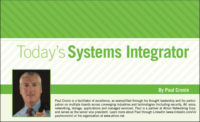Seeing Past the Generational Stereotypes in Your Security Business
While it can be easy to generalize, when we look closer, we may see that generations actually share some similar characteristics and behaviors.

After becoming fairly well-established in my career, over the past several years I have become accustomed to hearing generalizations and stereotypes about generations in our workplace. Here are some of the stereotypes I commonly hear: “Millennials are selfish, entitled, demanding, and not to mention, addicted to technology. Generation X is unfazed by authority and are skeptical and negative. Baby Boomers live for their jobs. Traditionalists are lost on technology.”
Are these judgments true? Undoubtedly, a whole generation cannot be lumped into certain tendencies or habits.
With more generations working together, misunderstandings based on stereotypes happen frequently in the workplace. First, let’s discuss the generations we are currently seeing in today’s workforce. The Silent Generation/Traditionalists (1925 to 1946), Baby Boomers (1946 to 1964), Generation X (1965 to 1980), and Generation Y/Millennials (1980 to 2000). (See https://bit.ly/244Yr1O) We are beginning to see the iGen/Gen Z (2000 to current year) enter our workforce — which makes five generations in today’s workforce.
Each generation seems to have its distinct characteristics and behaviors. The Silent Generation is characterized by adhering to rules, dedication to a company, and respect for authority. The Baby Boomers hold core values of equal opportunities, personal gratification, and personal growth. Generation X can be characterized by being independent, having high job expectations, and are pragmatic. Millennials are optimistic, confident, and extremely tech-savvy. The characteristics of the iGen or Generation Z are yet to be seen, but so far, they are diverse, independent, and open-minded. While it can be easy to generalize, when we look closer, we may see that generations actually share some similar characteristics and behaviors.
In addition to generational characteristics or behaviors, I would also argue that certain ages carry particular characteristics throughout the course of one’s life stages. For example, when I think back to the time when I was in my early 20s and getting ready to graduate college and begin my career, I remember being excited to finally “be an adult.” I felt the world was in front of me and there was so much to go out and do. Like most people in their early 20s, I was focused on myself, my future, my world — me. Many would say that my focus on me was selfish and entitled. Which it was. It needed to be. It needed to be all about me while I figured out life and how to be a responsible adult (which took some time). Today my focus, and what is important to me, has shifted away from entitlement and self-absorption to my family and what is best for the organization I work for — a much broader viewpoint and contribution to society.
Recently at an industry conference, I heard a profound statement made around stereotyping Millennials and their sense of entitlement. The panel discussion was “How to Create A Culture of Accountability,” presented at PSA TEC 2018. Christine Lanning, president of Integrated Security Technologies, Waipahu, Hawaii, said, “What 20 year old isn’t entitled and thinking about themselves? What 20 year old isn’t demanding and selfish?”
Christine just hit the nail on the head and these questions got me thinking. Is being entitled, demanding, and self-centered a generational thing or just being a young adult? Are different age groups really that different or does the human tendency to generalize and stereotype paint an inaccurate picture of entire generations? I tend to think it’s the latter.
Indeed, each generation has its characteristics and behaviors they may share, but stereotypes and false theories about others deter the contributions of individuals of all ages and organizational levels, which hinders collaboration, productivity, relationships, and individual self-perception. Getting past stereotypes is the first step in being part of and creating excellent teams. It is tempting to say, “Stereotypes exist for a reason, and as general proof they are true.” Of course, there is a reason, but that does not make them true nor does it give you an excuse not to look past them. Buying into stereotypes limits contributions and opportunities for others, as well as yourself.
A powerful way to demonstrate respect for others is to move past labels and treat people as individuals with unique experiences, preferences and interests. Invest time to discover what you have in common with individuals from other generations — needs, goals, interests, points of view, etc. What you share and learn from them can strengthen the human connection and sense of community that support collaborative work relationships. Regardless if you are young, old, or in between, we all want to do well. Everyone has something important to contribute. Take the time and initiative to find those talents and connections and help those around you meet their full potential.
For as Colin Powell once said, “Fit no stereotypes. Don’t chase the latest management fads. The situation dictates which approach best accomplishes the team’s mission.”
About the Author
Julie Rolles is training manager at PSA Security. She is a Gen-Xer — but please don’t stereotype her.
Looking for a reprint of this article?
From high-res PDFs to custom plaques, order your copy today!






